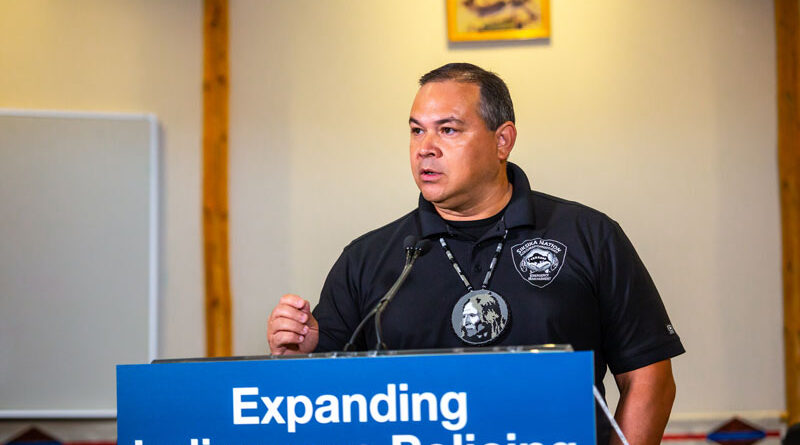Siksika Nation aims to establish local police service
By John Watson Local Journalism Initiative Reporter

John Watson Photo
Siksika Nation and the Province of Alberta have signed a memorandum of understanding (MoU) with the intention to establish a new Indigenous police service.
Should the new force see establishment, it wouldn’t be the first time Siksika Nation has had its own law enforcement service. A 10-year agreement between the federal and provincial governments saw the operation of a Siksika Nation police service from 1992 to 2002.
The tripartite agreement that established the service was not renewed beyond the initial term due to a lack of available funding.
Minister of Justice and Solicitor General Tyler Shandro met with Siksika Nation Chief Ouray Crowfoot on July 18 to announce the MoU.
“The Siksika Nation has identified establishing a police service as a priority for making its communities safer, and Alberta’s government believes in working with communities to help them address important public safety needs,” said Shandro. “We’re looking forward to productive discussions that will help the Siksika Nation realize its goal of building a safer community for its members.”
Since the closure of Siksika Nations localized service, the RCMP detachment in Gleichen has been responsible for policing in Siksika since 2002.
The nation has previously explored the idea of re-establishing a new police service, and in 2018 they hired a third-party firm to conduct a feasibility study. At the time, the provincial government covered a third of the cost of the study.
Siksika Nation is currently unable to proceed with developing its own policing service under the First Nations and Inuit Policing Program, due to the federal government having frozen the program while a review is being conducted.
“It’s really critical that we have our force on the Nation. We’ve worked closely with the RCMP and we have good relations with the Gleichen RCMP, but there’s a huge difference between having somebody not from on the nation, and somebody who is on the nation, knows the nation and knows the people,” said Crowfoot. “Our own force will reduce response time from police, which could save lives in those critical minutes or seconds in life-threatening situations. From a cost perspective, it would also be more efficient, as our own force would provide more preventative measures and not simply reactive measures to the community.”
